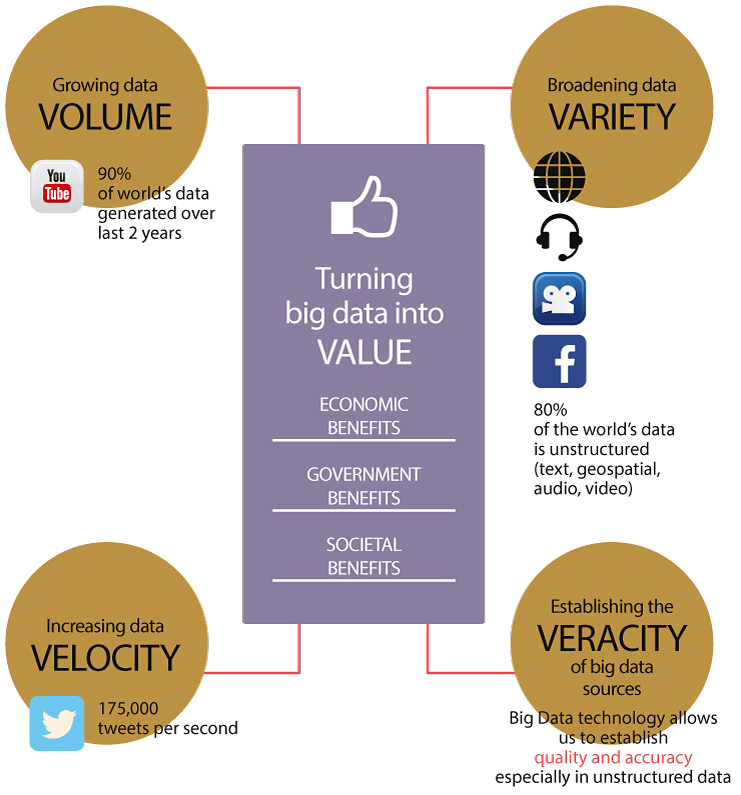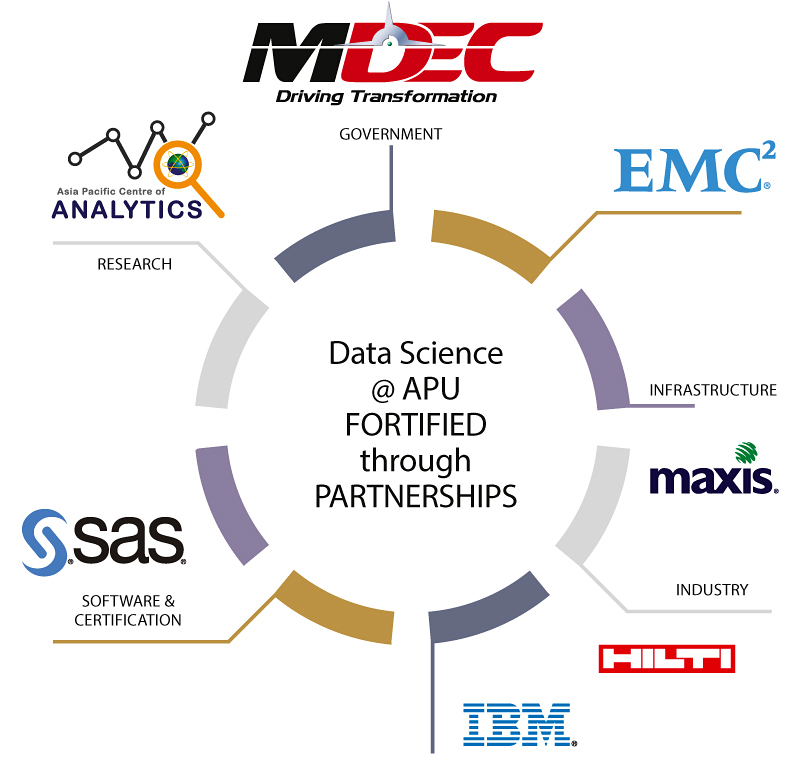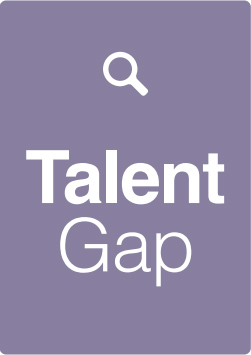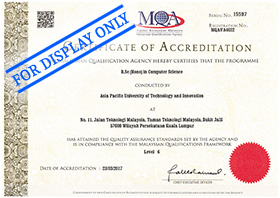You are here
Bachelor of Science (Honours) in Computer Science with a specialism in Data Analytics

|
|
|
APU-DMU DUAL DEGREE PROGRAMME |
MORE THAN JUST A COMPUTER SCIENCE DEGREE
APU's Bachelor of Science (Honours) in Computer Science with a specialism in Data Analytics degree is designed to provide you an edge with the latest technologies that are in line with the Industrial Revolution 4.0. |
ADMISSION REQUIREMENTS
GENERAL REQUIREMENTS | |
| DIRECT ENTRY TO LEVEL 1 OF THE DEGREE: | |
| STPM | • 2 Passes in STPM in Science stream with minimum Grade C (GPA 2.0) in Mathematics and one Science or ICT Subject. |
A-LEVEL | • 2 Passes (Grade A-D) in A-Level in Science stream with a Pass in Mathematics and one Science or ICT subject. |
| UEC | • 5 Grade B Passes in UEC in any subject including Mathematics and one Science or ICT subject. |
FOUNDATION/ | • A pass in Matriculation or Foundation studies with minimum CGPA of 2.0 with a Credit in Additional Mathematics at SPM/IGCSE/O-Level or its equivalent. Note: The requirement for the Additional Mathematics can be exempted if the Matriculation or Foundation offers Mathematics module which is equivalent or higher requirement than the Additional Mathematics at SPM level.
|
| DIRECT ENTRY TO LEVEL 2 OF THE DEGREE: | |
| ICT RELATED DIPLOMAS | • Diploma with a minimum CGPA of 2.50. Note: Student with CGPA above 2.0 and below 2.5 may be accepted using rigorous assessment conducted by APU and subject to the approval of the Academic Board. |
The above entry requirements may differ for specific programmes based on the latest programme standards published by Malaysian Qualifications Agency (MQA). The qualification and entry requirements for the programmes will be determined based on the "Comparison List of Equivalency of International Qualifications with SPM (O-Levels equivalent) and STPM (A-Levels equivalent)" published by Malaysian Qualifications Agency (MQA).
| ENGLISH REQUIREMENTS | |
INTERNATIONAL STUDENTS | • IELTS : 5.0 |
PROGRAMME OUTLINE
This programme is specifically designed to provide students with:
- The ability to develop technical knowledge, skills and background in the design and organisation of computer systems with an emphasis on data analytics.
- The ability to critically evaluate design paradigms, languages, algorithms, and techniques used to develop complex software systems.
- The ability to evaluate and respond to opportunities for developing and exploiting new technologies with data analytics concepts and tools.
DEGREE LEVEL 1 |
Students will learn fundamental skills required by every IT professional, and the basic understanding of programming, mathematical and algorithmic skills. Some specialised modules will provide them basic knowledge of underlying computer systems such as Computer Architecture, operating systems, networking and databases. The modules will also help them develop personal and organisational skills, as well as nurture creativity and innovation.
COMMON MODULES | |
|
|
SPECIALISED MODULES | |
|
|
DEGREE LEVEL 2 |
A broader range of skills will be learnt, in which students will gain better understanding of designing and implementing new software, and solving new computing problems through theoretical and algorithmnic foundations. They will gain solid understanding of platform technology and data analytics through modules in application development and knowledge discovery techniques. We will further nurture their creativity and innovation as well as independent learning to prepare them for the workplace.
COMMON MODULES | |
|
|
SPECIALISED MODULES | |
|
|
INTERNSHIP (16 weeks) |
Students will undertake an Internship/Industrial Training for a minimum period of 16 weeks to prepare them for a smooth transition from the classroom to the working environment.
DEGREE LEVEL 3 |
Students will make use of their previous studies and industrial experience to extend their familiarity in the field of computer science and to refine their personal and professional development. Students will move further into the focus on advanced analytics through business analytics and intelligence modules. A final year project requires them to investigate and develop a solution for a real-world problem – they will demonstrate their ability to combine technical knowledge, critical thinking and analytical skills to produce a personal achievement portfolio.
COMMON MODULES | |
|
|
SPECIALISED MODULES | |
|
|
MQA COMPULSORY SUBJECTS* |
|
|
(*All students are required to successfully complete these modules as stipulated by the Malaysian Qualification Agency.) Note: The specialism will appear only in the academic transcript. | |
CAREER OPTIONS
|
|
SAS - APU JOINT CERTIFICATE IN COMPUTER SCIENCE AND DATA ANALYTICS
| APU and SAS have signed an MoA in partnership to develop Data Scientists in Malaysia. SAS also has endorsed the UG and PG level programmes in Data Analytics by providing tools and educational material support for learning and research purposes. All UG and PG Data Analytics graduates will receive a Joint Professional Certificate from SAS. In addition, students will be awarded an e-Badge, to feature this achievement on their CV and LinkedIn profiles. |
WHY STUDY BACHELOR OF SCIENCE IN COMPUTER SCIENCE WITH A SPECIALISM IN DATA ANALYTICS?

Source: https://www.mushroomnetworks.com/
Graduates will be equipped with knowledge, skills and experience in three major dimensions: Strategic and Commercial application, “hands-on” ICT skills and Statistics & Analytics. The programme is not merely analytics-oriented, but develops the ability to use analytics to drive key success metrics related to yield management and revenue generation in practically any business domain. There is a tremendous requirement for Data Scientists and Big Data Specialists worldwide now and in the future, with hundreds of thousands of new job opportunities emerging globally. In Malaysia alone, by the year 2020 this need is expected to reach at least 15,000 professionals.
THE MALAYSIA BIG DATA VISION - DEMAND FOR DATA SCIENCE PROFESSIONALS
| “By the year 2020, it is envisioned that Malaysia will need to reach 15,000 Data Professionals” |
TURNING BIG DATA INTO VALUE - 4Vs

Source: MDeC Presentation on Big Data from 2015 APU's Big Data Week Launch
Dream Big: Think BIG - Reasons to Study BIG Data:
1. “The United States alone faces a shortage of 140,000 to 190,000 people with analytical expertise and 1.5 million managers and analysts with the skills to understand and make decisions based on the analysis of big data.” - McKinsey Report on BIG DATA
2. “Starting salaries for data scientists have gone north of $200,000” - Bloomberg
3. “The Whitehouse Administration is investing $200 Million into big data research projects” - Mushroom Networks
4. “Data scientists are the new superheroes,” says Pascal Clement, the Head of Amadeus Travel Intelligence in Madrid
5. “Malaysia needs additional 12,000 Data Scientists” - Ministry of Education
6. “Data Scientist: The Sexiest Job of the 21st Century.” - Harvard Business Review
Source:
https://hbr.org/2012/10/data-scientist-the-sexiest-job-of-the-21st-century
https://www.bloomberg.com/news/articles/2015-06-04/help-wanted-black-belts-in-data
https://www.mushroomnetworks.com/
DATA SCIENCE @ APU - FORTIFIED THROUGH PARTNERSHIPS

The programme has been carefully designed by APU with inputs and content from our partners, comprising major technology and software solutions providers, university partners as well as industry organisations who use analytics for strategic and competitive advantage.
The strength of these partnerships ensures that the programme comprehensively addresses all key stakeholders – Technology providers, Employers, Government as well as Students – in its learning outcomes, curriculum content, delivery and assessment. Students also obtain certification jointly issued with industry partners, which would certainly give them a head start in the exciting world of Big Data.
Furthermore, APU is also poised to become a frontrunner in analytics research through the establishment of the Asia Pacific Centre of Analytics (APCA), through which research activities will be undertaken to challenge boundaries in the application of analytics.

Graduates from this programme will not only gain an academic qualification from APU, but would also automatically attain a Globally Recognised Professional Industry Certification from SAS. Along the way, graduates would also gain exposure to industrial workshops led by experts from the industry, providing a valuable gateway into future careers.
COURSE FEES
Malaysian Students | International Students |
Year 1: RM 32,900 | Year 1: RM 33,600 (USD 7,815) |
* Fees stated here do not include Deposits and other Miscellaneous Fees. Please refer to Fee Guide for details.
MQA ACCREDITATION
(R2/0613/6/0055)(06/29)(MQA/FA4622) |
Computing & Technology Degree Programmes |
- Bachelor of Science (Honours) in Information Technology
- Bachelor of Science (Honours) in Information Technology with a specialism in Information System Security
- Bachelor of Science (Honours) in Information Technology with a specialism in Cloud Engineering
- Bachelor of Science (Honours) in Information Technology with a specialism in Internet of Things (IoT)
- Bachelor of Science (Honours) in Information Technology with a specialism in Digital Transformation
- Bachelor of Science (Honours) in Information Technology with a specialism in Financial Technology (FinTech)
- Bachelor of Science (Honours) in Information Technology with a specialism in Business Information Systems
- Bachelor of Science (Honours) in Information Technology with a specialism in Sustainable Computing
- Bachelor of Science (Hons) in Software Engineering
- Bachelor of Science (Honours) in Computer Science
- Bachelor of Science (Honours) in Computer Science with a specialism in Digital Forensics
- Bachelor of Science (Honours) in Computer Science (Cyber Security)
- Bachelor of Computer Science (Hons) (Artificial Intelligence)





